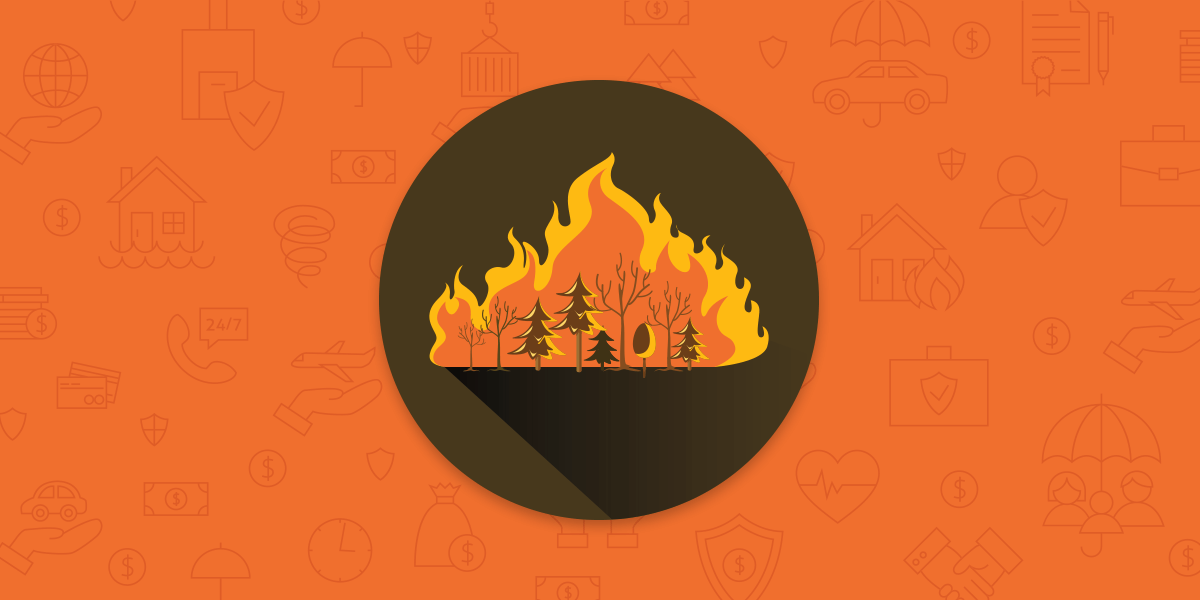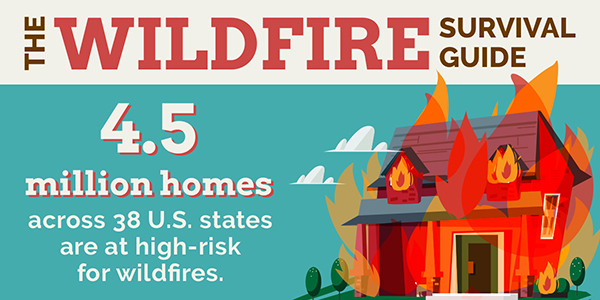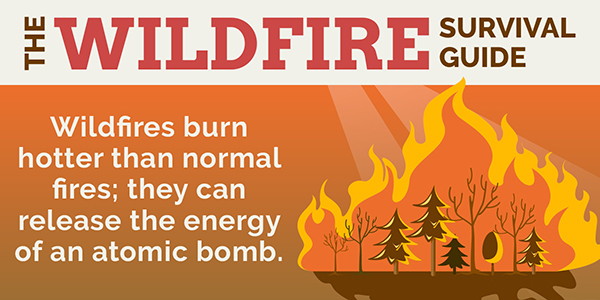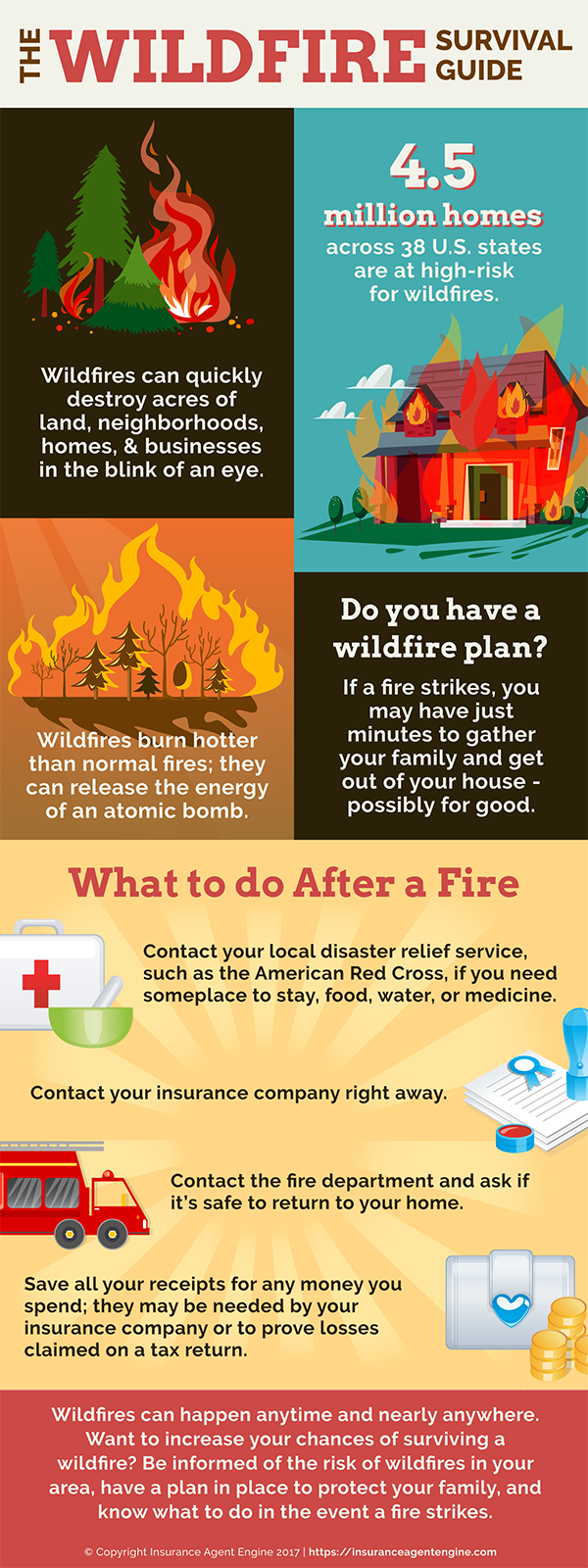
Nearly 8.5 million acres burned across the U.S. in 2017, a record year for wildfires according to the Insurance Information Institute. Wildfires swept through Northern California in October of 2017, leaving mass destruction and fatalities in their wake. On October 20, 2017, CALFIRE announced that the Tubbs Fire alone has sadly broken the record as the most destructive wildfire in California’s history.
The destruction was immense. The wildfires were responsible for at least 42 deaths, the destruction of 7,700 homes, wineries, and other commercial structures, and 221,000 acres of land. The losses are estimated between $3B - $6B.
Wildfires can spread rapidly due to high winds, low humidity, dry conditions, and warm temperatures. They can quickly decimate entire neighborhoods, spreading quickly across homes and businesses built in close proximity.
While California may be the state most known for wildfires, the risk extends far beyond the western state.
A Wildfire Survival Guide: What You Need to Know
Wildfires can quickly destroy acres of land, neighborhoods, homes, and businesses in the blink of an eye.

4.5 million homes across 38 U.S. states are at high-risk for wildfires.
- Wildfires mostly threaten the western United States.
- 2 million at risk homes are in California, the state most associated with wildfires.
- 8 of the 10 most costly wildfires in the U.S. have occurred in CA.
California isn’t the only state at risk for wildfires. Texas has been known to have 2x as many wildfires as California in any given year.

Wildfires burn hotter than normal fires; they can release the energy of an atomic bomb.
- Fires spread rapidly when homes are in close proximity to each other.
- Homes burned during wildfires most frequently catch fire from live embers blown by the wind.
- Close proximity of homes and the presence of combustible features (wood, plastic, foliage) increase the chance of a home going up in flames.
Check out our Wildfire Survival Guide Infographic below and then keep reading to find out what you need to know to protect your home, family, and business from wildfire catastrophes.

Are You Prepared for a Fire?
In a wildfire situation, you may have just minutes to gather your family and get out of your house - possibly for good.
These five steps will help you be prepared for a fire.
- Have an evacuation plan in place. Know where you will go if you need to evacuate, and how you will reunite if separated from family.
- Know what to take. In addition to your disaster supply kit, you may need clothing, pillows, bedding, personal hygiene items, medications, and pet supplies.
- Create a home inventory. A detailed home inventory can help with the insurance process in the event of a fire.
- Don’t forget important documents. Be sure your most important documents - insurance policies, birth/ marriage certificates, social security cards, driver’s license, financial accounts, passports, and recent tax returns - can be taken with you in a moment’s notice.
- Plan for your pets. Include them in your emergency planning. Be sure they are wearing properly fitting collars with tags. Include photos of your pets with medical records and store with other important documents.
What’s in Your Disaster Supply Kit?
A disaster supplies kit is a collection of basic items your household may need in the event of an emergency. Each person in your family should have a disaster supply kit ready to go.
Don’t wait for a disaster to strike before preparing your kits. Many of these items can be pre-assembled and kept ready in a grab-and-go bag. Keep larger, heavier items in a tub or chest on wheels that can be easily lifted into a car if you have to evacuate suddenly.
What to pack:
- Water - 3 gallons per person
- Food - 3 day supply of non-perishable
- Flashlight
- First aid kit
- Extra batteries
- Local maps
- Dust masks
- Can opener
- Wrenches or pliers to turn off utilities
- Matches
- Cash (small bills)
- Infant supplies such as diapers, wipes & formula
- Change of clothing and sturdy shoes
Re-evaluate your evacuation bag every year and repack as needed. Always keep a sturdy pair of shoes and flashlight near your bed in the event of a sudden evacuation at night.
What to do if a Wildfire Strikes
Wildfire spreads quickly. Leave as soon as fire officials recommend evacuating your area; don’t delay. Evacuating early helps keep roads clear so firefighters and emergency vehicles can do their jobs.
- Call 911 and report the fire.
- Turn on your lights to make your home more visible.
- Turn off gas and appliances before you evacuate.
- Cover up in long sleeves and pants to protect against heat and flying embers. Wear sensible, sturdy shoes.
- Secure your home before you leave: shut windows and lock doors.
- Take your evacuation bag and emergency supplies with you.
- Locate your pets and take with you whenever possible.
- Follow your family evacuation plan.
What to do After a Fire
Some homes are completely destroyed by wildfires, while others may still be standing after a fire is out. These steps will help you in the immediate aftermath of a fire.
- Contact your local disaster relief service, such as the American Red Cross, if you need someplace to stay, food, water, or medicine.
- Contact your insurance company right away.
- If your home is still intact, contact the fire department and ask if it’s safe to return.
- Ask the fire department if your utilities (electric, gas, water) are safe to use.
- Do not turn them on yourself.
- Be alert for downed power lines or other hazards.
- Contact your landlord or mortgage company about the fire.
- Save all your receipts for any money you spend; they may be needed by your insurance company or to prove losses claimed on a tax return.
- Get in touch with financial institutions to report any credit cards that were lost in the fire.
- Begin saving receipts for expenses related to the fire.
Recovering after an emergency takes time. From emotional recovery to financial recovery to rebuilding your home or business, disasters like wildfires can have a long-lasting impact.
Wildfires can happen anytime and nearly anywhere. Want to increase your chances of surviving a wildfire? Be informed of the risk of wildfires in your area, have a plan in place to protect your family, and know what to do in the event a fire strikes.